
Discover more from Ruminato
What if World War Three Is Here and Nobody Told Us?
World War conflicts are like dominoes

Note: This is likely too long for your email application. Click the title to view it on the web or app. It’s free for everyone. Thanks!
Hey kids! With Netanyahu wading into the American presidential election by laying waste to the Levant, I thought today would be a good day to chat about Armageddon, Malthusian events, and general extinction-level mayhem! Aren’t you excited?
Come on in! Let’s blow things up! Yeah. I know this article is a little long. But it’s important. The dance video can wait.
It’s a little long because first, I’m going to make you sad. You see, I have to throw a little history at you. Don’t shoot me. I’m only the messenger. Sometimes, we need history to really get at what is going on in front of us. It’s not my fault.
So before we fret over a third world war, we need to look at previous world wars. Officially, there have been two since the beginning of the twentieth century, if you don’t count the Cold War, which laid waste to dozens of countries throughout the world while threatening to nuke us all into radioactive kabobs.
World War One
World War One pretty much began in Sarajevo, which also happens to be the setting for one of my favorite examples of a human musical instrument (Pavarotti’s crescendo at about 4:20 when he sings “L’amore…” is one of humanity’s finest moments — you really should play it while you’re reading the rest of this).
On June 28, 1914, in Sarajevo, six assassins from a movement of Serbians called Young Bosnia, which sought Bosnian independence from Austria-Hungary, took out an archduke who was in line to become the successor to the Emperor of Austria and King of Hungary, Franz Joseph.
Strangely, and I know you won’t believe this, the assassinated archduke’s mustache survived the ensuing grenade attack and flying bullets from the upstart Serbs and, today, lies in state in Vladimir Putin’s bedroom.
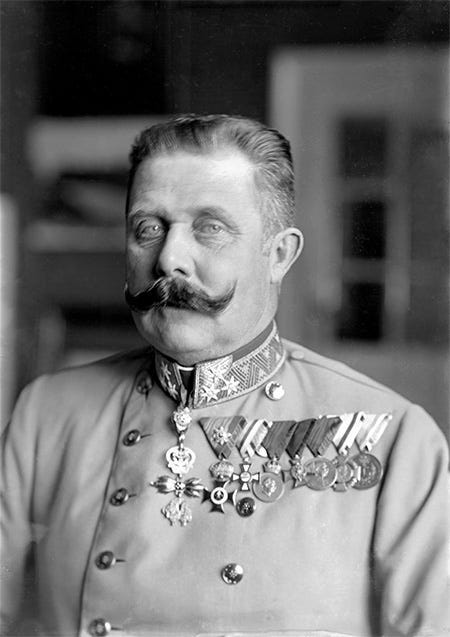
It’s a helluva mustache though, right?
After the assassination, the world, including Austria-Hungary’s King, Franz Joseph, yawned. He was so unmoved that he said, “A higher power has re-established the order which I, alas, could not preserve.”
Satisfied with his wit, he then resumed his daily three-hour routine of pimping his mutton chops:
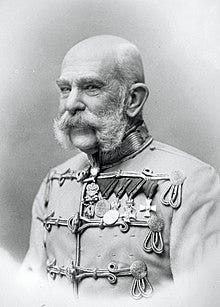
So keep this in mind as we continue today’s lesson. What seemed like small potatoes at the time can become quite a big deal over a longer time.
You only need to look at the map below to know that something was going to get people worked up into a frenzy about one thing or another. In the early 1900s, when the map of your region of the world had that many colors representing different ethnic groups, bad things were gonna happen.
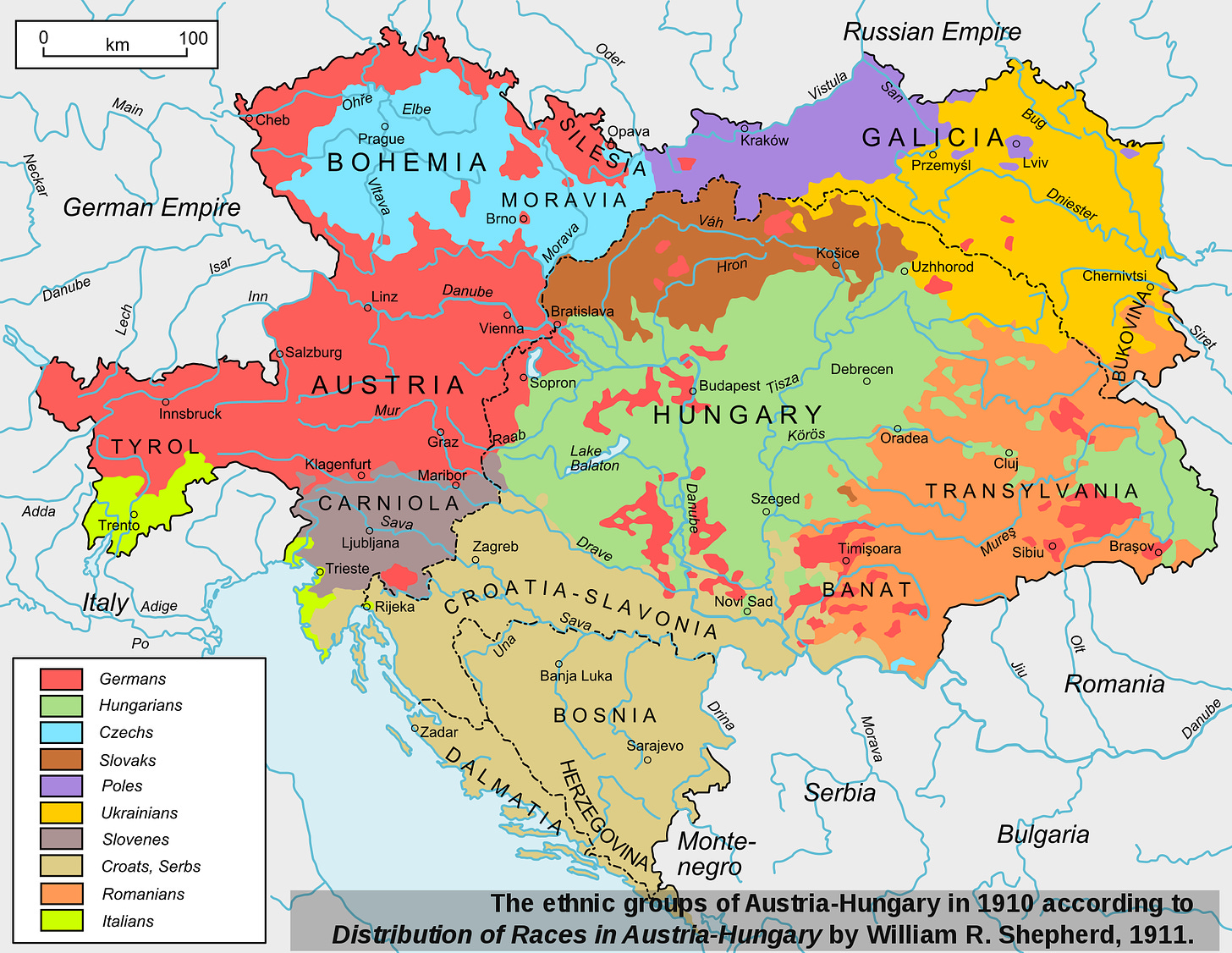
And happen they did.
Austria-Hungary, which in those days was a formidable world power, but also full of disparate ethnic groups, encouraged anti-Serbian protests throughout Bosnia-Herzegovina. Mostly for the hell of it. The central government wasn’t really that freaked out about the assassination.
They weren’t necessarily happy about it, mind you, but as I said, they sort of shrugged their shoulders. There was facial hair to trim and awards to pin to lapels. In other words, much more important things were afoot. However, some factions in the government saw the assassination as an excuse to stir up trouble in the Bosnia region.
This led to a series of bizarre events and ultimatums involving Austria-Hungary trying to formalize control over the increasingly restive Serbs, Austria’s German allies pleading for patience but promising their full backing in case things got ugly, the Germans, in turn, making a strange ultimatum to the Serbs and then to Russia, who supported the Serbs, and the English and French scratching their heads but promising a fight if the German empire tried to bully its eastern neighbors, including Russia.
Whew! Did you get through that paragraph without damaged neurons? I know I didn’t.
Anyhoo, mostly, it was all about Austria-Hungary being mean to the Serbs, and one thing leading to another.
The British in those days were trying to play the role of a neutral party by leading negotiations of some sort between the various powers, but since nobody really knew the core of what the hell everyone was arguing about, their efforts failed.
The assassination of the archduke, despite not being a big deal to the man the archduke was in line to succeed, ended up being the fuse that lit a long-smoldering bomb.
First, there was the 1908–1909 Bosnian Crisis. This sort of laid the groundwork for the archduke’s assassination because Austria annexed a big chunk of territory, called, variously, Bosnia and Herzegovina or Bosnia-Herzegovina, depending on which maps you like the most.
And the groundwork for that was laid by other stuff that involved picking apart the Ottoman Empire.
The Ottoman Empire, which was the forerunner to what we now call Turkey (or Turkiye, for those who abhor naming countries after big, tasty, flightless birds), had, until 1878, been running the show in Bosnia-Herzegovina. It lost that territory in a war with Russia in 1878, so the Austrian-Hungarian Empire occupied much of the territory and bossed everyone there around like Kanye with a new girlfriend.
The Ottoman Empire had a long, glorious history that began way back in the 1500s. It was a military, cultural, and scientific powerhouse for a long time, but by the late 1800s, other powers started chipping away at it.
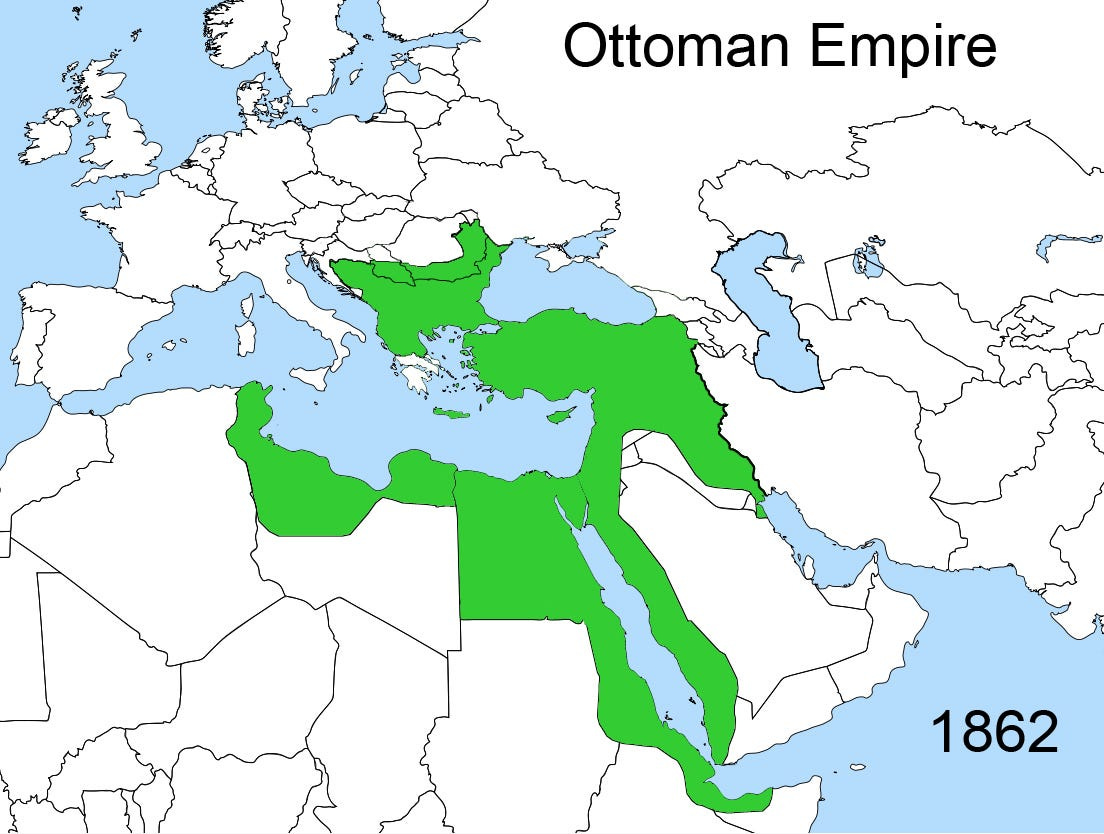
See all that green in the North? Chip chip chip (1871):
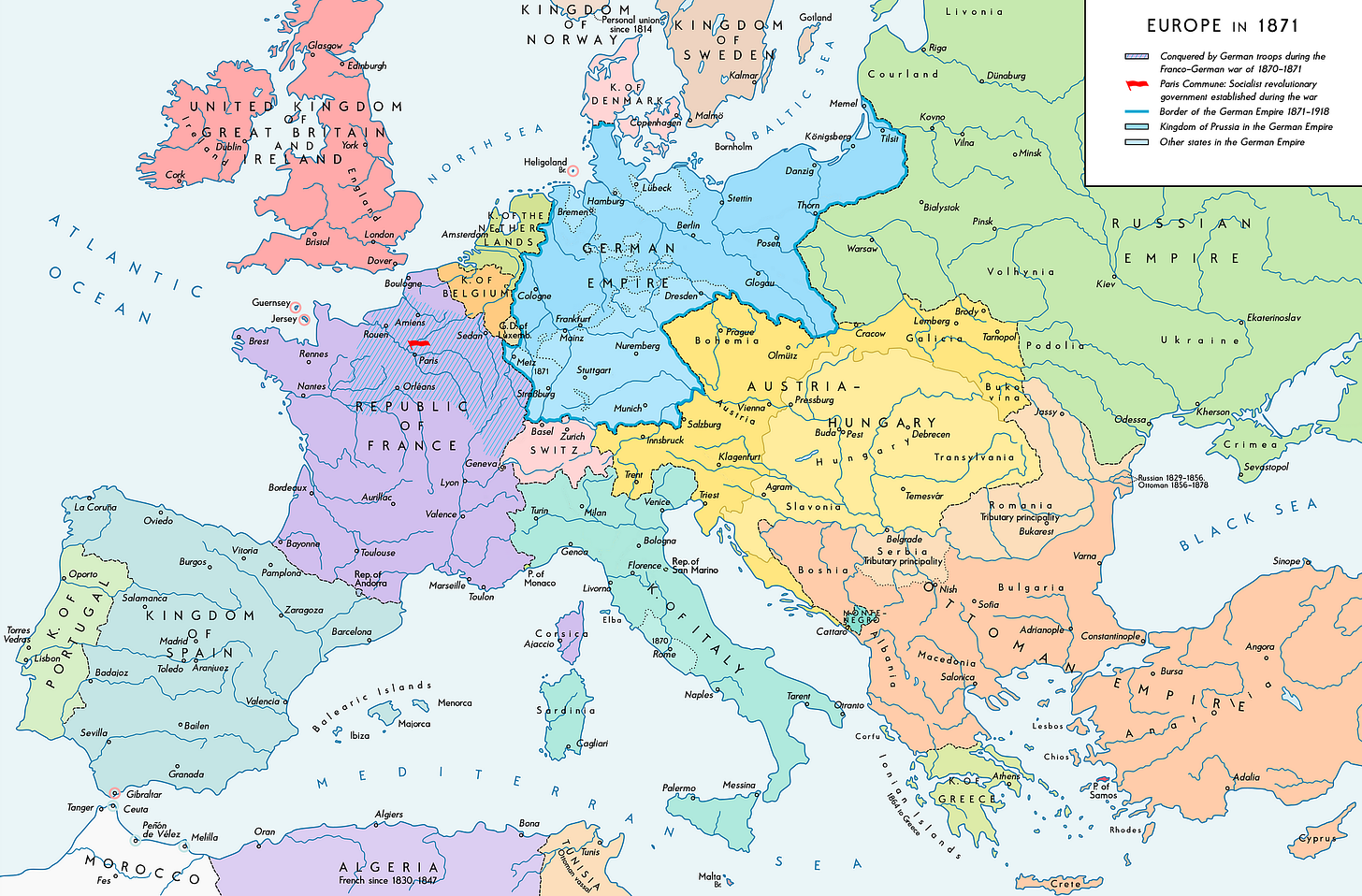
Chip chip (1878):
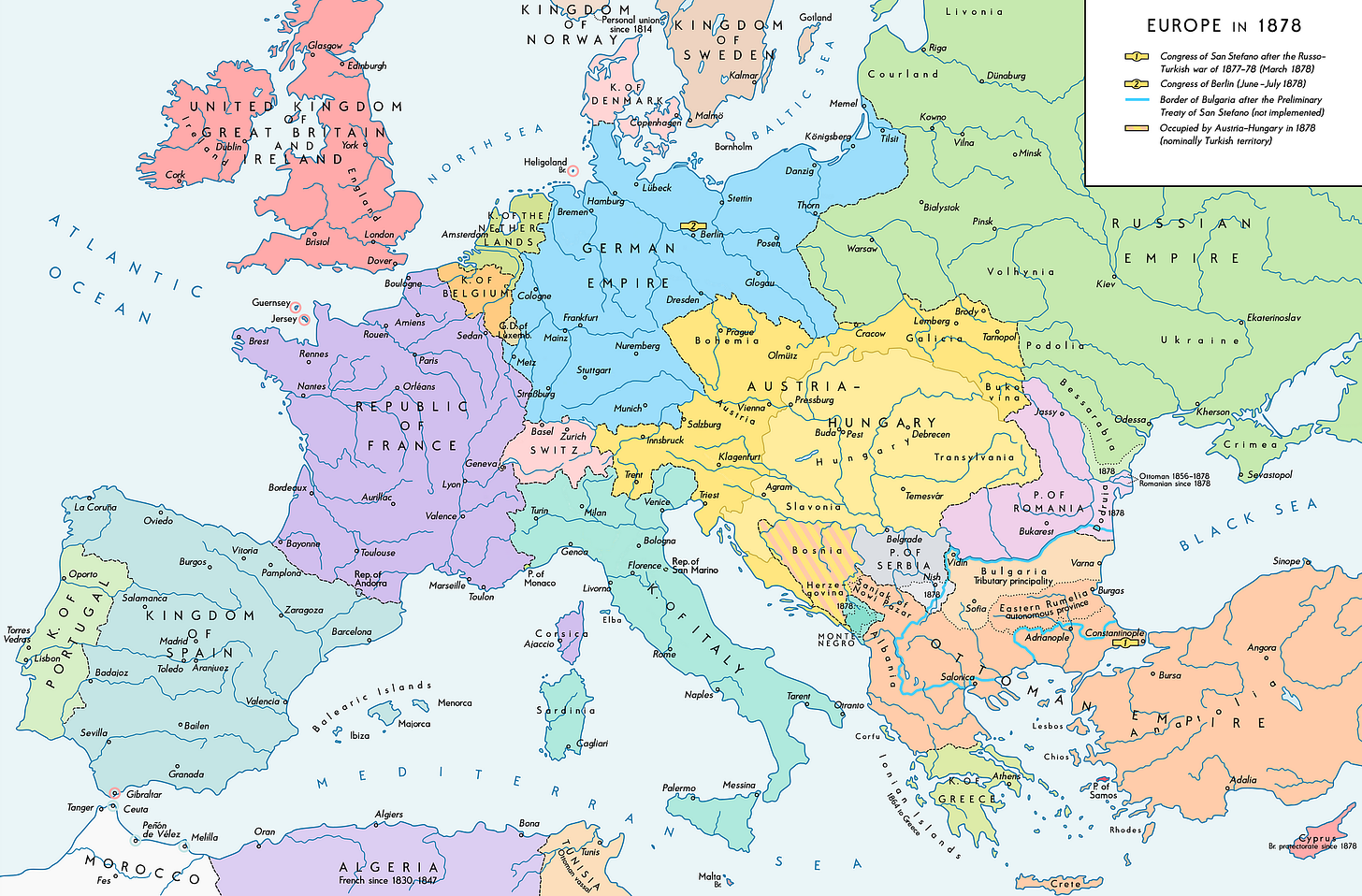
The Russians weakened the Ottoman Empire badly in the Russo-Ottoman War of 1877–78, so the Italians, partly because in those days “just because” was a good enough reason, attacked. This led to a two-year war during the years 1911 and 1912, which further weakened the Ottomans.
Back in those days, if someone was down, you kicked them in the head. Kind of like Bruce Lee’s Kato, only much worse.
The Italians during that war went into North Africa and grabbed Libya, which in those days was called the Tripolitania Vilayet (aka Ottoman Tripolitania, aka ایالت طرابلس غرب). Please don’t yell at me if you’re Libyan, but that was a much cooler name.
Whoever designed the Austrian-Hungarian king’s mutton chops must have made up the names of countries in those days, too.
This led to the formation of an alliance of Serbia, Bulgaria, Montenegro, and Greece called the Balkan League, which in turn led to the First Balkan War of 1912–1913. The idea here was that those countries would gang up on the down-and-out Ottomans.
So they did. You’d think that a bunch of small Eastern Orthodox countries would jump up and down and be all excited about their successful little 20th-century crusade against a Muslim power on its way out, but nope.
They argued and fought a Second Balkan War amongst themselves.
Men. Yeesh.
The net effect of all that foolishness was that a lot of that area got absorbed into Austria-Hungary, which made the area ripe for a nasty kerfuffle and the assassination of an archduke none of his peers much cared about.
World War One was a stupid war, but it cost a lot of lives, and its stories of trench warfare are legendary.
You see where I’m going with all this, right? All these conflagrations added up to one worldwide war. Stupid or not. And not overnight.
Nobody was walking around saying, “Woah, we’re in a world war.”
People were so crazy in those days that once the shooting started, they were as excited as teenagers at a Taylor Swift concert.
Below is a photo of people celebrating in London after war was declared against Germany, who had attacked France for reasons that elude most historians (something to do with the Balkans and helping out Russia or some such).
Fun fact: In those days, the English were so white that their facial features were completely invisible! If you don’t believe me, check out the picture.
Are you listening to Pavarotti? If not, get back up there and hit play. This stuff is gonna get depressing.
World War Two
The motivations for the start of World War Two were different. After losing the war, Germany became a failed state unable to move forward when World War One’s victors imposed a penalty involving massive reparations.
You could almost say that World War Two began the moment World War One was over. But it was different than World War One because a vicious troll emerged in Germany who presided over the eventual direct murder of six million Jews, nearly two-thirds of Europe’s entire Jewish population.
Millions of other people were killed for various other reasons, such as being gay or simply not being “Germanic” enough.
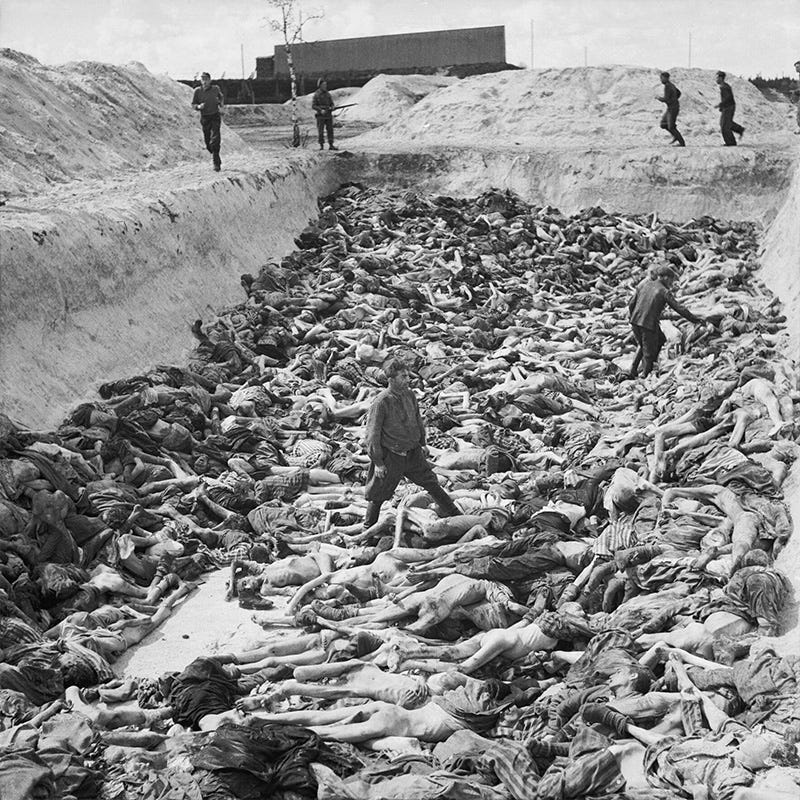
Defending against Hitler wasn’t a question among serious people.
Estimates of the final tally of the world’s dead vary wildly. Some say 70 million. Others 85–90 million. Most of them were civilians. Anybody like me who grew up with parents caught up in the war understands that there was also a deep psychological toll that was never confronted like it would be today.
I mean, today, hell, people think there’s a psychological toll when the barista gets their caffè latte wrong.
Like World War One, though, WW2 started before the official start times that historians normally assign.
The first war changed the maps of Europe completely. Austria-Hungary? Gone. The German Empire? Gone. The Ottoman Empire? Gone. The Russian Empire? Gone, replaced through revolution by the Soviet Union.
New nations arose from the ashes of some of these empires.
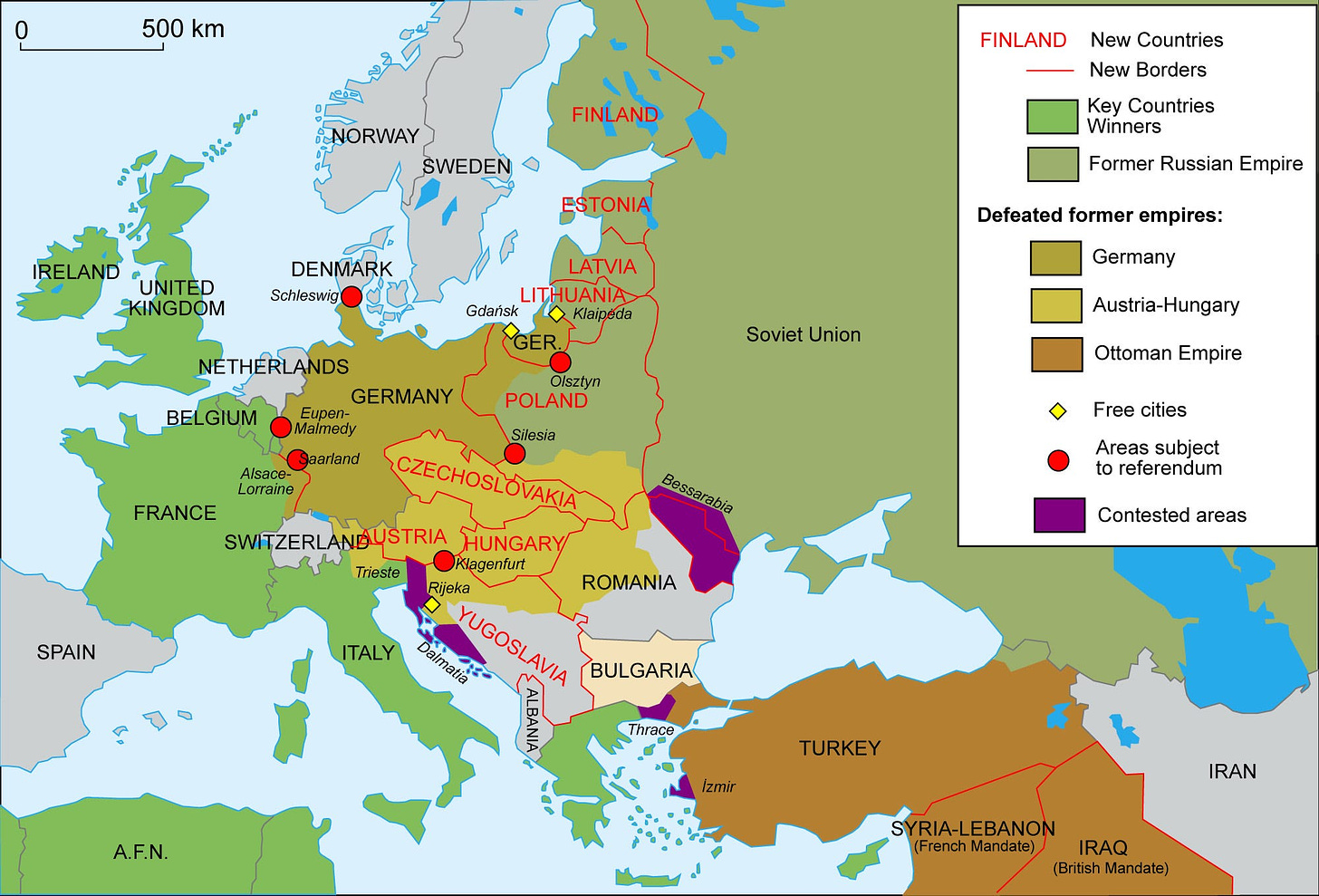
The German military, refusing to concede their losses, found themselves at the mercy of troops who had had enough of the idiotic bloodletting. German sailors, instead of following orders to continue fighting against British warships, led a revolt in Wilhelmshaven, a naval port, in October 1918.
That event demonstrates the excuse that German enlisted personnel and conscripts were merely following orders when the murderous regime that followed directed the mass killing of innocent civilians was perhaps a bit generous. But hey, I can be quite a nitpicker when I want to be.
The military revolt spread to the point where Emperor Wilhelm II, who had become the German emperor as the prize for winning a mustache contest, fled the country. Socialists seized the day.
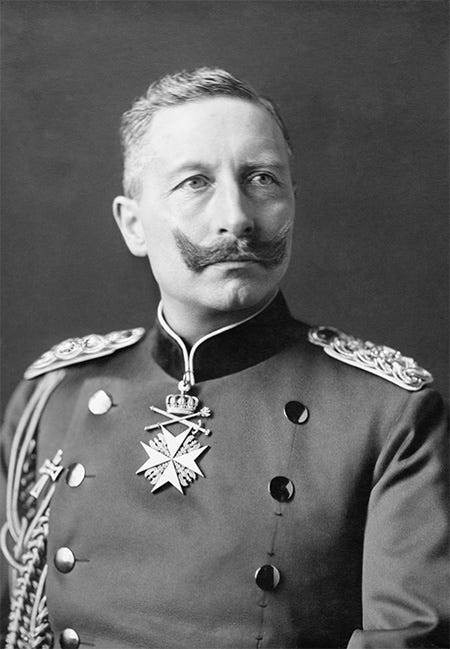
This gave birth to the Weimar Republic and its famous inflation, an inevitable result of impossibly high reparations and sanctions.
Most historians assign September 1, 1939, as World War Two’s start date, because it’s the day a renewed German army invaded Poland.
For Americans, it started on December 7, 1941, when the Japanese bombed Pearl Harbor.
One famous World War Two historian, A. J. P. Taylor, though, assigns the beginning of the war to Japan’s invasion of China in 1937.
Still others go back to 1935, when two hundred thousand Italian troops and their chemical weapons and artillery marched into Eritrea, a sometimes region of Ethiopia.
Some history buffs attribute the start of World War Two to the Spanish Civil War of 1936–37. Oh, by the way, Generalissimo Francisco Franco is still dead:
I say that it started in 1933 when Adolph Hitler became Chancellor of Germany. The point here is that the precise beginning is nebulous.
Once he consolidated power, Hitler’s Germany began to absorb other European countries without as much as a whimper from other European states. (This is similar to the MAGA takeover of the U.S. House of Representatives and Supreme Court.)
He absorbed Austria and claimed a region of Czechoslovakia, the Sudetenland, which were regions all along the Czech northern, western, and southern borders containing people of German descent.
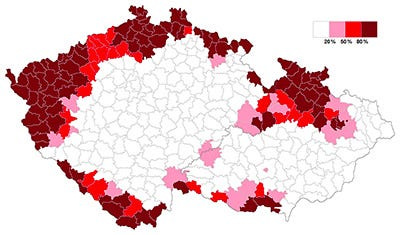
This kind of thing was happening all over the world. Nobody at the time was walking around saying, “Woah, we’re in a second world war.”
They were still partying and celebrating the end of World War One, thinking the worst was behind them.
World War Three
The current world war is much more like the second than the first. There are two identifiable bad guys in Vlad Putin and Benjamin Netanyahu. Neither is Hitler-level, but both are sociopaths.
Putin also happens to be a brilliant admiral of psychological warfare, whereas Netanyahu seems skilled at the military end (the pager attacks were insidious, but from a tactical standpoint, rather brilliant).
With their help, the world has taken many steps that historians may someday use to argue over when the bigger war starts.
The first step in recognizing the severity of global conflict in 2024 is recognizing the elephant in the room. I’m not talking about the banal Republican Party, although they play a big role in all this.
I’m talking about the 2016 election when Putin invaded the U.S. social media space to change the outcome of a presidential election.
You might say, come on, seriously? And I’d reply by reminding you of Cambridge Analytica, the massive troll farm associated with the Internet Research Agency in St. Petersburg, and the fact that Americans are still at each others’ throats in large part because the troll farm was so successful at sowing division.
Few people realize that when they’re yelling at people on Facebook, they’re yelling at paid trolls or people influenced by them. Even much of the Bernie Bro/Hillary infighting of 2016 was instigated by Putin’s Internet Research Agency.
This may all sound like conspiracy-mongering, but the evidence has been overwhelming. It’s all in the public record. Much of it was uncovered by Robert Mueller in his first, and now forgotten, investigation of the man Putin helped bring to power. Many of the trolls you see online are still bought and paid for by Russian counterintelligence or by dark money outfits controlled by right-wing tech bros and men like Leonard Leo.
Among the shock troops is Steve Bannon, Trump’s first henchman and still a MAGA true believer, who has a show called The War Room and a long history of troll-feeding. In his writing and statements, he’s been clear that he is at war with America (hence the name of his podcast).
Between Bannon’s trolls and Fox News, nearly half the country is now technically brainwashed. Bannon is temporarily interred, but he’s still screaming from his jail cell1.
Putin plays the long game. He’s been an enemy for years, since his first days as Russia’s president. He spent many of his early years consolidating power and hammering away at places like Chechnya and Georgia.
Not our Georgia, of course. That task was left to his American puppet2.
Putin has been waging psychological warfare on the U.S. for a long time, but NATO was also busy expanding into Russian border countries like Latvia and Lithuania. That wouldn’t be much different than Mexico joining the old Warsaw Pact, which was a Soviet sphere of influence in Eastern Europe that was formed shortly after World War Two.
Partly in response to NATO expansion, Putin attacked and absorbed Crimea into Russia in 2014. You may not know where Crimea is, so here’s an infographic:
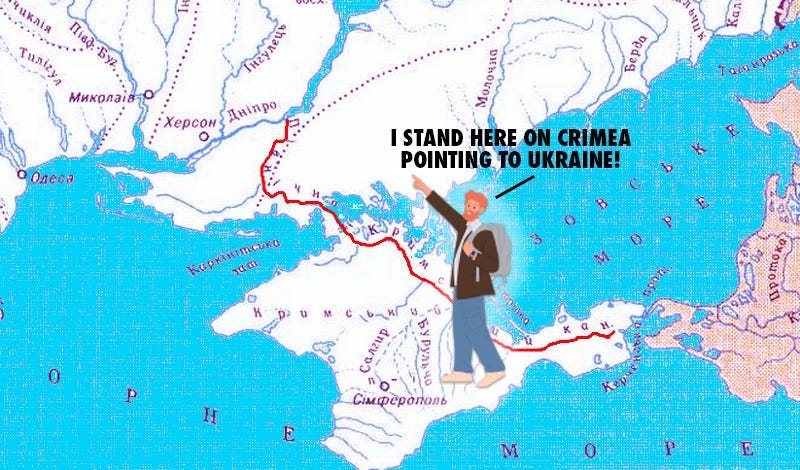
Why did Putin invade Crimea? His claim was that Crimea belonged to Russia and that its people were Russian. There are grains of truth to that, and there are, indeed, many ethnic Russians there. But he mostly wanted Crimea’s warm water seaport, Sevastopol.
This was 2014. Putin is a long-term gamer. He doesn’t expect to win today or tomorrow. He just expects to win, knowing the U.S. doesn’t have the patience to wait him out.
The long game is still paying off for Putin. He was losing in Ukraine, but the war has since turned into a stalemate. Putin is now hopeful that the clown show can return to the Oval Office so he can finish off Ukraine.
Anyone familiar with the patience and endless resources of the Russian military, no matter how incompetent it is, knows that it’s unlikely Ukraine can outlast the Russians. They just don’t have the manpower. And Putin has an endless supply of helpless young conscripts from the ethnic, non-Russian hinterlands he can feed to a ravenous monster of trench warfare that looks a lot like World War One.
After Putin’s U.S. puppet lost re-election, the puppet smeared the country with lie grease that came directly out of his bowels, and convinced 40% of registered voters that the election was stolen, despite 50+ court cases demonstrating that it wasn’t, and despite the fact he’s facing RICO charges (sort of) in the state of Georgia for fabricating the whole thing.
Putin shrugged off his puppet’s re-election loss and went back to work3 4 fomenting discord in U.S. social media networks with the help of Bannon and others, invading everything from gaming platforms like Discord to Facebook and the cesspool once known as Twitter, which is now a formal mouthpiece for the right under the guidance of a committed fan of apartheid, Elon Musk (occasionally referred to as Leon by the Confused in Chief).
We now have no way of knowing the level of Twitter infiltration because it’s a closed neo-nazi social media community like 4Chan where the rest of us are allowed to sometimes play if we follow the unknown Musk rules.
And now, Netanyahu has chosen the American presidential cycle to start a wide-ranging war in the Levant. He began by reacting to Hamas’ heinous attacks on Israel by pretty much wiping out Gaza and killing 40,000 people there. This created a nasty split in the ranks of the Democratic party. I consider this an unlikely coincidence.
Many of Netanyanu’s bomb victims were children. There’s nothing left of Gaza, so he turned to Lebanon, where he did something only a sadist could think of doing: He intercepted electronic devices in the supply chain and blew them up in the faces of those using them. At least two young children died that we know of. Probably more.
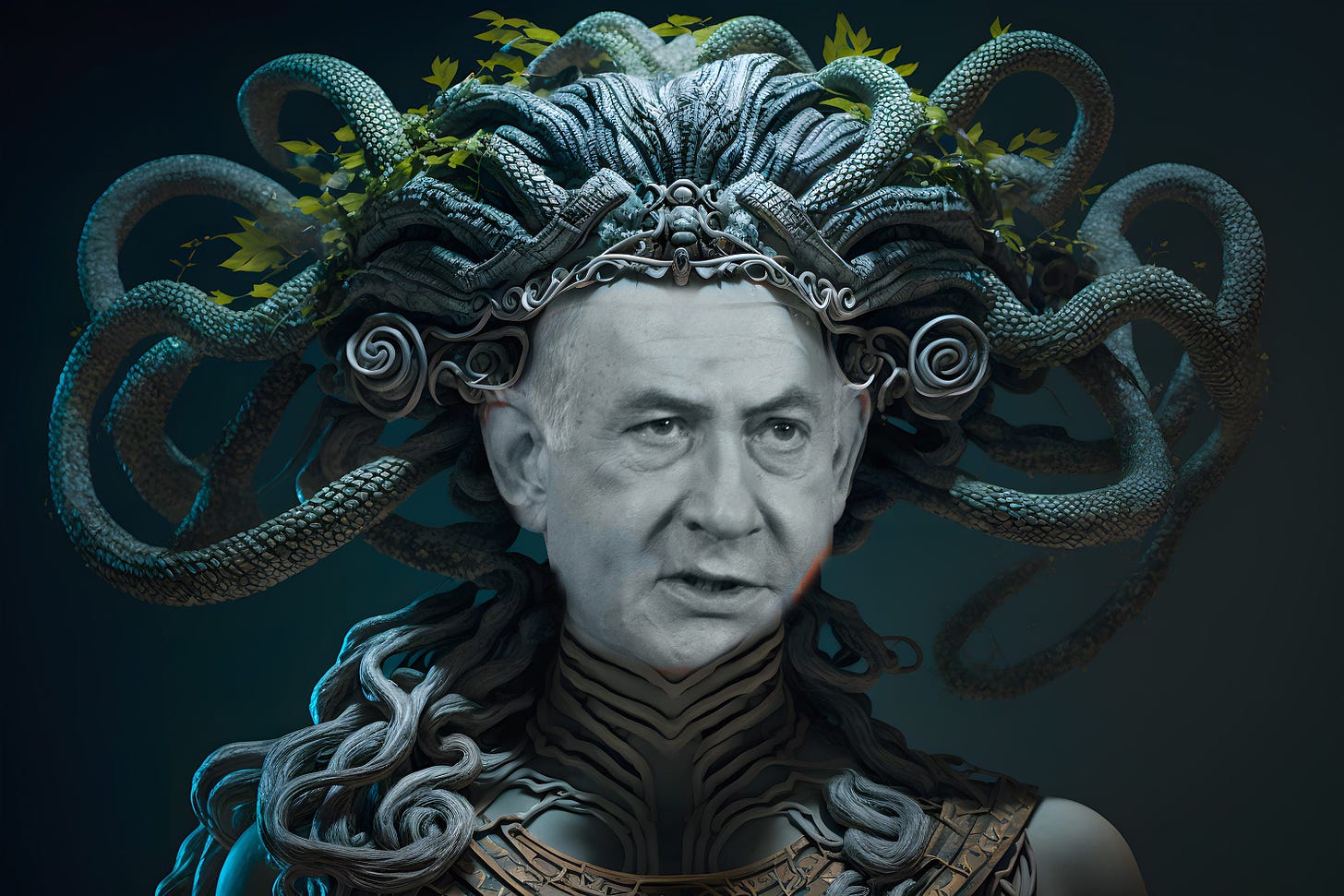
Now he’s strafing southern Lebanon and dropping bunker-busting bombs to take out Hezbollah’s leadership, and if a few dozen kids are blown to shreds or maimed for life, so be it. He’s attacked Yemen, a small country on the southern Arabian peninsula that is a haven for another Iranian proxy, the Houthis.
The Saudis had previously bombed the living crap out of the Houthis without altering their belligerence. Usually, in these cases, the targets of such attacks double down.
But Netanyahu’s timing suggests that his goal isn’t wrecking the Houthis. His main goal seems to be to interfere with the American election. Human life is incidental during these considerations. He’s got a larger war he wants to win: defeating Kamala Harris at the polls so that the guy who moved the American embassy to Jerusalem and helped strengthen Netanyahu’s political base will return to the Oval Office.
Netanyahu is trying to goad Iran into a major war. The fact that Kamala Harris has to rely on the good graces of Iran’s authoritarian theocracy to win an election is pretty scary, but the Ayatollahs hate Trump almost more than you do, so they may just hold off on major retaliation until after the election.
Let’s hope so.
If the price of gas is five dollars a gallon as a result of a major regional war in the Middle East, Americans will vote against Kamala Harris just to register a complaint. It’s what they do. It bears repeating:
Americans get upset if our latte order is hosed. When the price goes up a tad, we hit the roof.
If that happens, Putin’s authoritarian puppet will be in power again, and this time he is likely to fill the government with people who think like the people who took over the House of Representatives. That’s the goal of Project 2025.
The convict-in-chief will then do all kinds of wacky things, like pulling out of NATO and maybe even the UN, and imposing wild, inflationary tariffs.
Dominoes will fall bigly.
We may lose World War Three without a shot between Russia and the U.S. ever being fired.
Notes
I may have made up a few things about facial hair during the first world war. But I’m not officially a historian, so I don’t mind the minor hit to my reputation.
Justice Department Disrupts Covert Russian Government-Sponsored Foreign Malign Influence Operation Targeting Audiences in the United States and Elsewhere: U.S. Department of Justice
Portions of this were originally published on the Medium platform.
Subscribe to Ruminato
Essays and Fiction by Charles Bastille, author of MagicLand, Psalm of Vampires, and Restive Souls





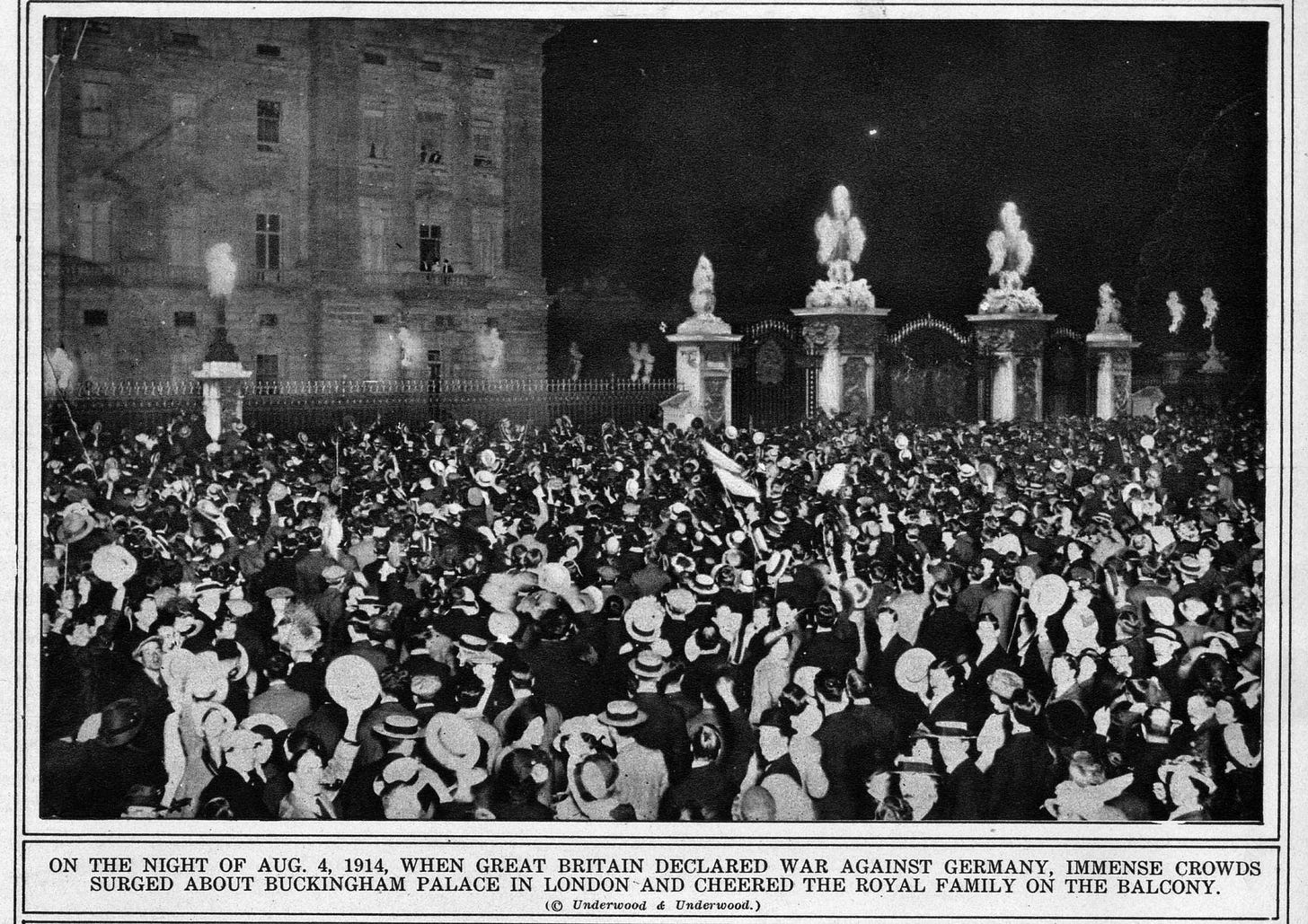
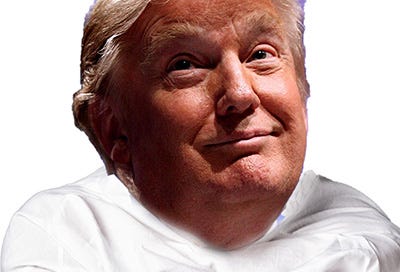





Highly accurate history and spot on analysis of current events.
I now have serious mustache envy.
You just covered two sophomore world history and a bonus international relations courses.